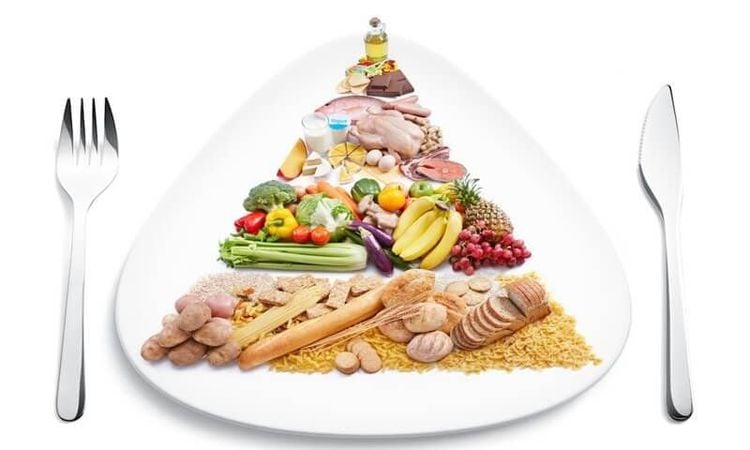This is an automatically translated article.
Nutrition for 8-month-old children is very important, because this is the period when children need to be provided with adequate energy sources for comprehensive development. So what will the menu for children at this age have and how much should be given to children?
1. What can 8-month-old babies eat?
When the baby is 8 months old, at this time breast milk is still the best source of nutrients for the baby's development. At this age, children have had certain physical changes, such as learning to talk and crawl; Therefore, parents need to provide enough essential energy for their children to have a long and active day.
In addition to the main food source is breast milk, you can give your baby solid foods with pureed foods or powdered porridge. Initially, the mother should give her baby liquid food, then switch to a thicker form to help the baby adapt gradually. At the age of 8 months, the child's nutritional menu also needs to be diverse and ensure that there are enough groups of substances, such as vitamin C, vitamin A, protein, protein, fiber, and carbohydrates. Here are nutrient-rich foods that mothers can add to their 8-month-old's daily nutritional menu, including:
Starch: bread, rice, instant flour, pasta Fat: oil gac, cheese, cheddar cheese or unsalted butter. Protein and protein: chicken thighs, chicken breast, salmon, pork, beef fillet, yogurt, tofu, egg yolk. Fiber: tomatoes, carrots, spinach, broccoli, peas, beans, zucchini, radishes, potatoes, sweet potatoes, leeks, onions. Vitamin C: apple, pear, orange, banana, cherry, watermelon, papaya, mango, strawberry, avocado, grape.
Trắc nghiệm: các chỉ số cần chú ý về sự phát triển thể chất của trẻ
Chiều cao, cân nặng của bé ở từng giai đoạn nên là bao nhiêu là bình thường, bao nhiêu là bất thường? Cùng ThS.BS Ma Văn Thấm điểm lại xem bạn đã nắm được các chỉ số phát triển thể chất của bé chưa nhé!The following content is prepared under supervision of Thạc sĩ, Bác sĩ y khoa, Ma Văn Thấm , Nhi , Phòng khám Đa khoa Quốc tế Vinmec Dương Đông(Phú Quốc)
2. How much should the baby eat?
Normally, the amount of milk provided per day for children from 6 months and older is 750-1000 ml of milk. When feeding your baby solid foods, you should gradually reduce the amount of milk and gradually increase the amount of powder. You can give your baby 2 meals of powder/day. Your baby's daily food needs to be full of rice flour, vegetables and animal protein such as ground beef and lamb. In addition, the mother can give the baby more cookies in the meal to increase chewing ability and help teeth develop.
For children who are 8 months old, mothers can give them 2-3 meals of porridge and 1-2 snacks in a day. Side dishes should be pureed fruit, yogurt, chopped hard-boiled eggs, fruit or smoothies. When preparing baby food, the food must be cut into small pieces and cooked to make it easy for children to chew and avoid choking when eating. When cooking porridge for the baby, the mother should also add a little fish sauce and a small spoon of cooking oil to increase the flavor, helping the child to enjoy the food more.
Studies have shown that children are born knowing how to regulate their food intake, that is, they know to eat when they are hungry and stop when they are full, so forcing children to eat too much has unintentionally inhibited them. This innate ability of children, can even lead to obesity, adversely affecting the child's health later in life.

In particular, 8-month-old babies were able to show their interest in eating. However, how do you know if your baby has had enough? Here are some signs that you can refer to:
Swipe spoon Turn your head away when parents feed Squeeze your lips when the spoon comes close to your mouth Spit food out of your mouth Cry In case your child doesn't want to eat foods solid food, you should wait a few days and try again later. Some babies take longer than others to get used to eating with a spoon. Therefore, be very patient and do not force children to eat when they do not want to, avoid creating fear of eating, anorexia for children.

3. What should not be given to an 8-month-old child?
It is absolutely necessary to supplement with nutritious foods for babies during this period, however, parents also need to be aware of some foods that can be harmful to the health and development of children. Children, including:
High-calorie foods: if your baby eats high-calorie foods at this age, it will adversely affect the child's digestive system. Foods containing a lot of salt and sweets: the kidney function of an 8-month-old child is not really as complete as that of an adult, so when a child eats salty foods, the kidneys have to work too hard to filter salt out of the body. . In addition, giving children a lot of sweets will create a feeling of fullness quickly, making children not want to eat main meals, and can even cause tooth decay when the child has just teethed.
Honey: in honey contains very high sugar content and includes Clostridium botulinum spores - a substance that can cause poisoning, coma and constipation in babies. Therefore, nutritionists have recommended that honey should not be given to children under 1 year of age to avoid situations that endanger the health of children. Cow's milk: in the first 12 months of life, breast milk is still the best food for babies. However, cow's milk can adversely affect the kidney function of children, so mothers should not give cow's milk to their children at this time. Seafood: shellfish such as crabs, snails, scallops and shrimp are on the list of foods not for children under 1 year old. These are foods that contain substances that are easy to cause allergic reactions, especially young children and immature immune systems, so there is a high risk of allergic reactions when using them.

4. Some tips when feeding 8-month-old babies
If this is your first time introducing solids, you can refer to some helpful tips below:
If your family has a history of food allergies, you should discuss them with your pediatrician. faculty to choose the right foods for children. You should also consider certain high-risk foods, such as peanuts or eggs, before giving them to your baby. Fried foods are not a good choice for babies. Your baby's diet at this stage should include grains, fruits, vegetables and meat. You should feed your child 2-3 meals a day.
In addition to rice, barley, cereal or oats, you should also offer other cereal-based products such as cookies, toast or dry cereal. Avoid sugary and colorful cereals. Have your baby sit in a high chair when eating, because feeding while he is crawling around can cause him to choke. Reduce the number of times your baby is breastfed or bottle-fed to practice solids. For children to be healthy and develop well, it is necessary to have a nutritious diet in terms of quantity and quality balance. If children are not provided with adequate and balanced nutrients, it will lead to diseases of excess or lack of nutrients, which adversely affect the comprehensive development of children in terms of physical, mental and motor skills.
The period of baby eating solid foods is an extremely important period to help children develop comprehensively. Children who do not eat properly are at risk of micro-mineral deficiencies, causing anorexia, growth retardation, malabsorption, etc. If they notice the above signs, parents should supplement their children with supportive products. The supplement contains lysine, essential micro-minerals and vitamins such as zinc, chromium, selenium, and B vitamins to help fully meet the nutritional needs of children. At the same time, these essential vitamins also support digestion, enhance nutrient absorption, help improve anorexia, and help children eat well.
Parents can learn more:
Signs of zinc deficiency in children
Micronutrient deficiency and failure to gain weight in children
Please regularly visit Vinmec.com website and update useful information to take care of your child. Take care of the baby and the whole family.
Reference source: webmd.com














